Ceylon and Cassia cinnamon are two distinct types of cinnamon. Ceylon, often called "true cinnamon," is native to Sri Lanka and has a delicate, sweet flavor with very low coumarin content, making it safer for daily consumption. Cassia cinnamon, which includes varieties like Korintje, Saigon, and Chinese cinnamon, is more common in supermarkets and has a stronger, spicier taste but higher coumarin levels. Understanding these differences helps you choose the right spice for your culinary and health needs.
Table of Contents
- What Are Ceylon and Cassia Cinnamon?
- Visual Comparison: What Do They Look Like?
- Flavor Face-Off: Taste Differences Explained
- Health Benefits: Which One's Better for You?
- How to Use Them in Cooking and Baking
- Buying Guide: How to Choose Between the Two
- Frequently Asked Questions
- Final Verdict: Which One Wins?
What Are Ceylon and Cassia Cinnamon?
The confusion between Ceylon and Cassia cinnamon starts with the name itself—both are called "cinnamon," but they're as different as apples and oranges. Let's break it down:
- Ceylon Cinnamon: Also known as "true cinnamon," this comes from Sri Lanka and is harvested from the inner bark of Cinnamomum verum trees. It's more delicate, sweeter, and has a subtler flavor profile.
- Cassia Cinnamon: A broader category that includes Korintje (Indonesian), Saigon (Vietnamese), and Chinese cinnamon. Cassia comes from Cinnamomum cassia or Cinnamomum burmannii trees and is spicier, bolder, and often sold as regular "cinnamon" in most supermarkets.
| Feature | Ceylon Cinnamon | Cassia Cinnamon (Including Korintje) |
|---|---|---|
| Appearance (Sticks) | Thin, layered bark; looks like tightly rolled paper | Thicker, single-layer bark; appears rougher and darker |
| Color | Pale brown to tan | Dark reddish-brown |
| Texture | Fragile and crumbly when ground | Hard and fibrous when ground |
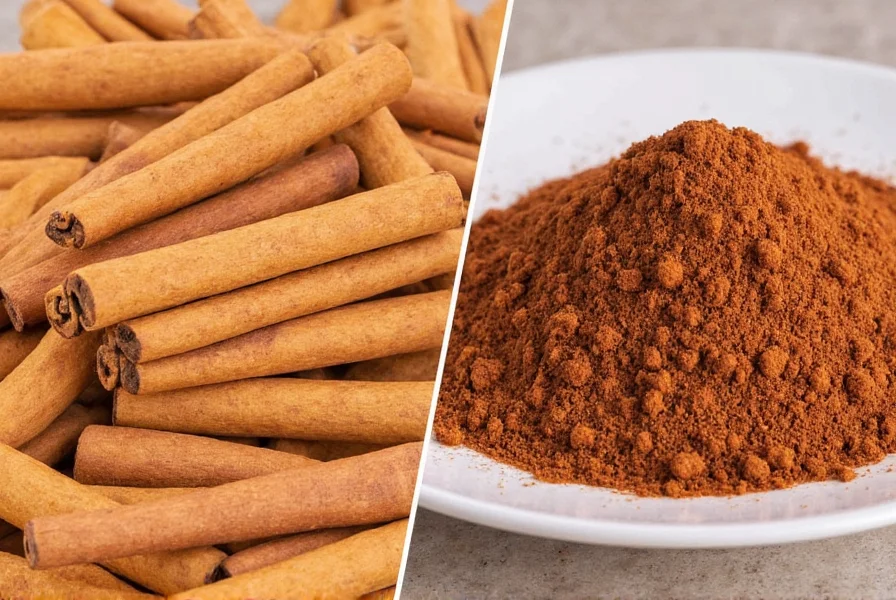
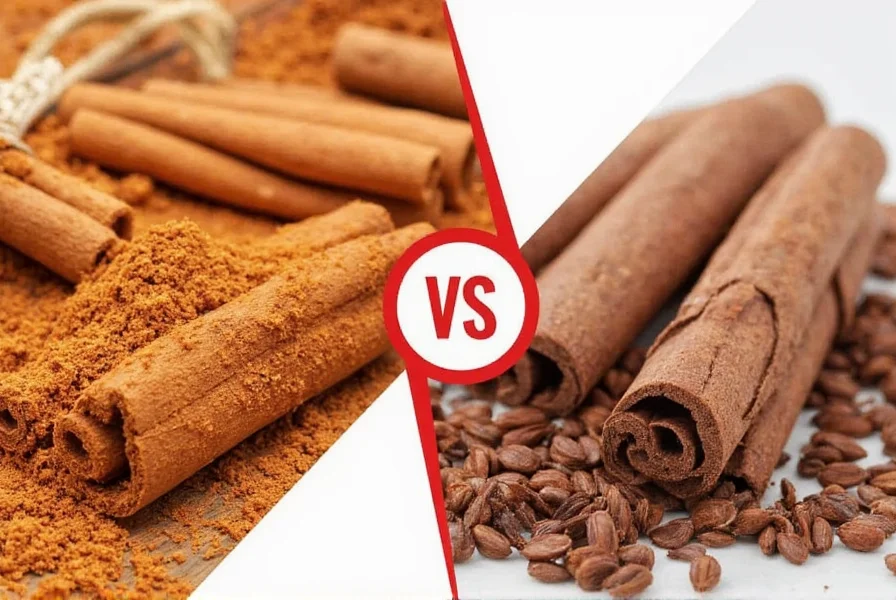
Why the Confusion?
Most store-bought "cinnamon" is actually Cassia. Unless specifically labeled as "Ceylon" or "true cinnamon," you're likely getting a Cassia variety like Korintje. But that doesn't mean one is better—it depends on your needs.
Flavor Face-Off: Taste Differences Explained
Taste-wise, these two cinnamons go head-to-head like superheroes from rival comics. Here's how they stack up:
- Ceylon: Subtle, floral, citrusy notes with a hint of sweetness. It's more refined and complex, making it perfect for gourmet baking and desserts where you want a nuanced flavor.
- Cassia (including Korintje): Strong, spicy, slightly bitter edge. This is the classic cinnamon taste we associate with cinnamon rolls, oatmeal, and hot chocolate.
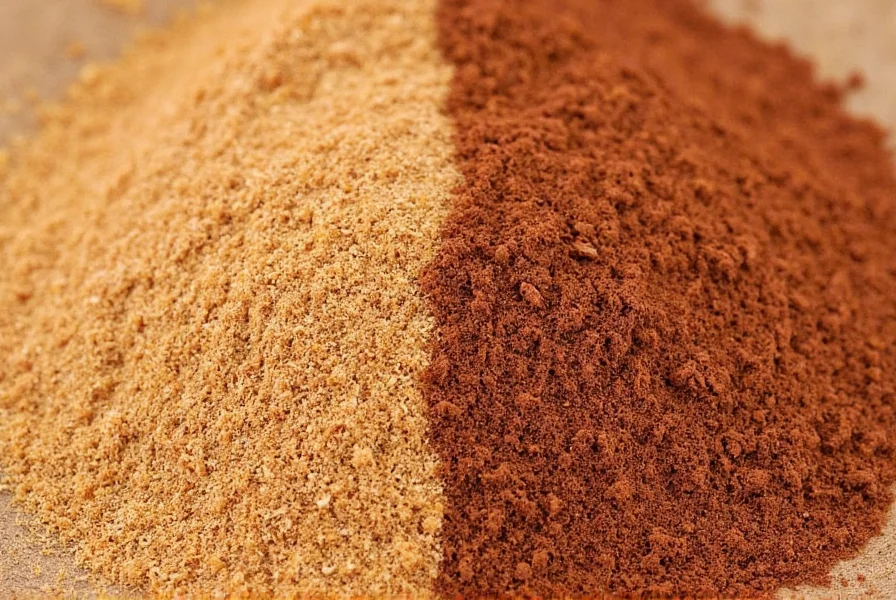
When to Use Each:
- Ceylon: Use when making custards, puddings, French pastries, or delicate cakes.
- Cassia: Ideal for hearty baked goods like cinnamon swirl bread, spiced lattes, or mulled wine.
Health Benefits: Which One's Better for You?
Here's where things get interesting. While both spices have antioxidant properties and potential health benefits, the key difference lies in their coumarin content—a natural compound found in many plants.
- Ceylon Cinnamon: Very low in coumarin. This makes it safer for daily consumption and long-term use, especially if you're taking supplements or consuming large quantities. The FDA recommends limiting coumarin intake due to potential liver risks.
- Cassia Cinnamon: Contains higher levels of coumarin, which can be harmful in high doses over time. Not recommended for heavy use, especially for people with liver conditions.
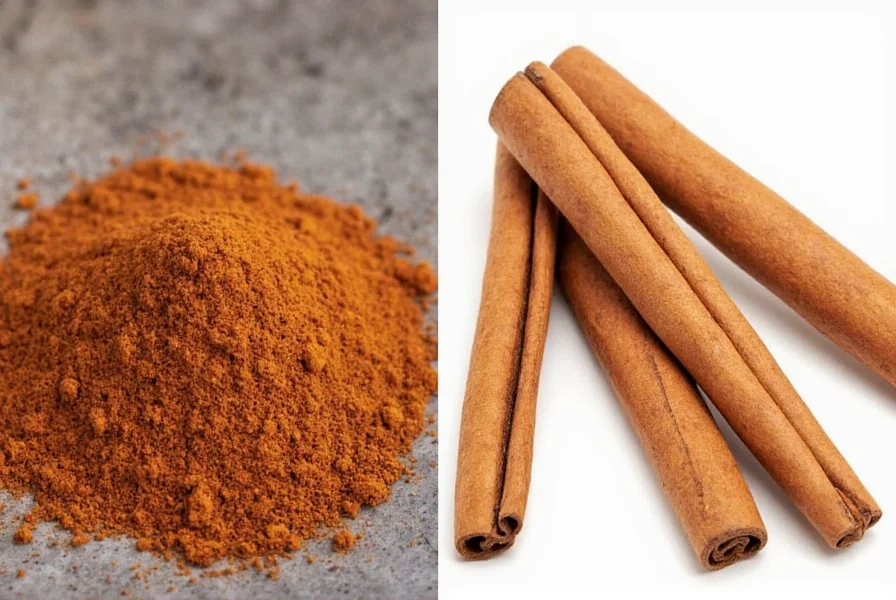
Nutrition Quickie:
Both contain fiber, calcium, and anti-inflammatory compounds. But if you're looking for daily wellness support or using cinnamon for blood sugar management, Ceylon gets the gold star due to its safety profile.
How to Use Them in Cooking and Baking
Now let's talk about the fun part—using them! Whether you're whipping up a batch of cookies or infusing oils and syrups, choosing the right cinnamon can elevate your dishes from good to chef's kiss.
Ceylon Cinnamon: Gourmet Perfection
- Makes custards, creams, and fine pastries taste richer without overpowering
- Perfect in tea blends and chai for a smooth finish
- Adds elegance to rice puddings, fruit compotes, and delicate sauces
Cassia Cinnamon: Bold & Spicy
- Ideal for hearty baking—think cinnamon rolls, spiced muffins, pumpkin pies
- Lends warmth to marinades, chili rubs, and savory spice blends
- Great in beverages like hot cocoa, coffee, or mulled cider
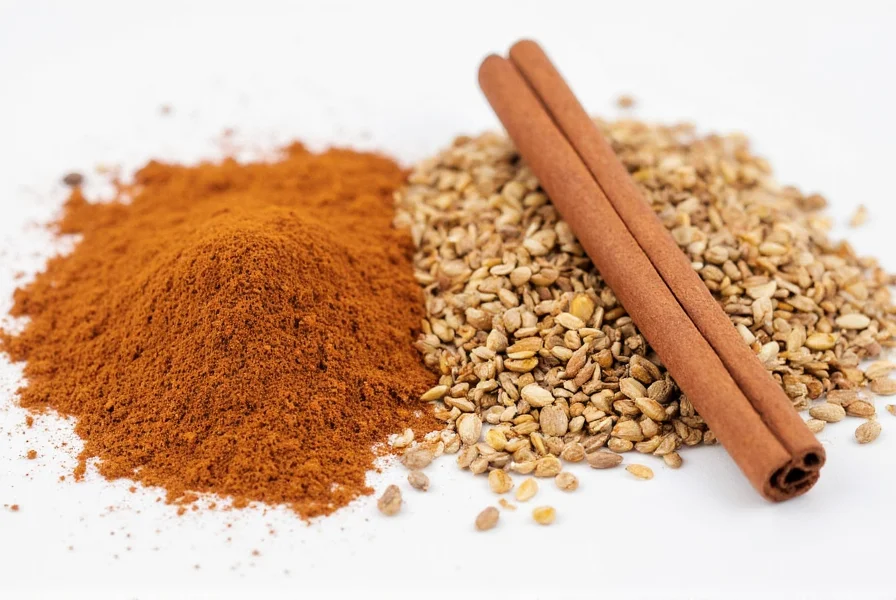
Pro Tip:
Grind your own sticks at home for fresher, more potent flavor than pre-ground options!
Buying Guide: How to Choose Between the Two
So, you're standing in front of the spice rack now. Which one do you reach for? Let's break it down into an easy decision guide:
Choose Ceylon If:
- You want a milder, more complex flavor
- You plan to consume it regularly (especially in teas, supplements, or daily cooking)
- You're preparing something delicate like custard, cream, or white chocolate
- You value quality and authenticity over cost
Choose Cassia If:
- You love that bold, punchy cinnamon flavor
- You're making something robust like cinnamon toast, coffee cake, or holiday cookies
- You're on a budget (it's usually cheaper than Ceylon)
- You only use it occasionally
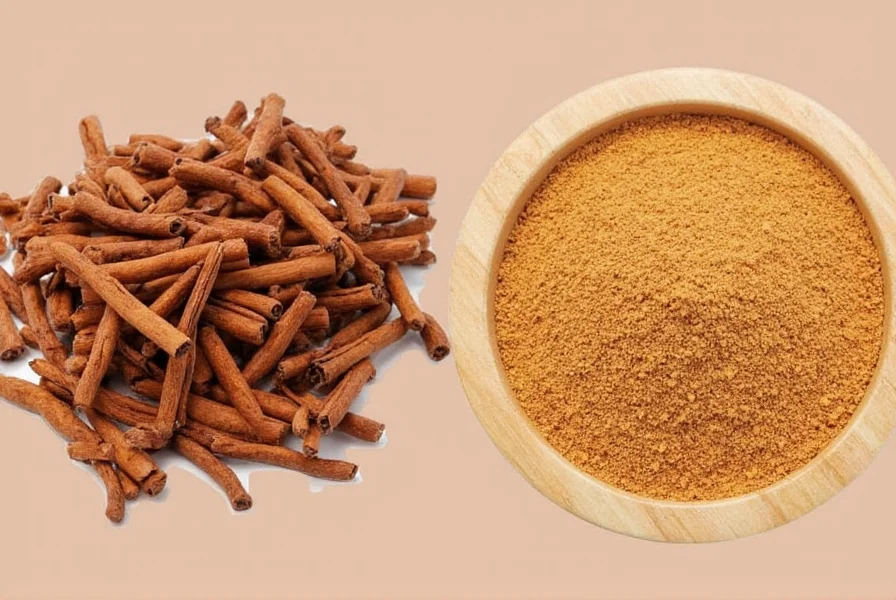
Where to Buy:
- Ceylon Cinnamon Sticks: Specialty stores, gourmet shops, or online retailers like Amazon, Penzeys, or Mountain Rose Herbs
- Cassia Cinnamon Powder: Available in most grocery stores, bulk chains like Costco, or supermarket brands (Korintje is the most common Cassia variety in U.S. stores)
Label Check:
Look for labels that clearly state "Ceylon" or "Cinnamomum verum." Most generic "cinnamon" products are Cassia varieties, including Korintje.
Frequently Asked Questions
What's the main difference between Ceylon and Cassia cinnamon?
The main difference is that Ceylon cinnamon (true cinnamon) comes from Cinnamomum verum trees and has a delicate, sweet flavor with very low coumarin content. Cassia cinnamon (including Korintje) comes from Cinnamomum cassia or burmannii trees, has a stronger, spicier flavor, and higher coumarin levels.
Is Korintje cinnamon the same as Cassia cinnamon?
Yes, Korintje is a specific variety of Cassia cinnamon (Cinnamomum burmannii) grown primarily in Indonesia. When people refer to "Cassia cinnamon" in stores, they're often talking about Korintje or similar varieties like Saigon cinnamon.
Which cinnamon has more health benefits?
Both have antioxidant and anti-inflammatory properties, but Ceylon is generally considered healthier for regular consumption because of its significantly lower coumarin content. High coumarin intake from Cassia over time can potentially cause liver issues.
Why is Ceylon cinnamon more expensive?
Ceylon cinnamon is more expensive due to its labor-intensive harvesting process (peeling multiple thin layers of bark), lower yield per tree, and more limited growing regions (primarily Sri Lanka). It also has higher demand from gourmet markets.
Can you tell Ceylon and Cassia apart by taste alone?
Yes, experienced cooks can distinguish them by taste. Ceylon has a delicate, sweet, citrusy flavor with subtle complexity, while Cassia is stronger, spicier, and has a slightly bitter edge. The difference is especially noticeable when tasted plain or in simple preparations.
Is one type of cinnamon better for diabetes management?
Both types may help with blood sugar regulation, but Ceylon is generally recommended for people using cinnamon regularly for diabetes management because of its lower coumarin content. However, you should consult with a healthcare provider before using cinnamon as part of a diabetes management plan.
Which cinnamon is more common in grocery stores?
Cassia cinnamon (including Korintje) is by far the most common type found in grocery stores in the US and Europe. Unless specifically labeled as "Ceylon" or "true cinnamon," what you're buying is almost certainly a Cassia variety.
Does the coumarin content really matter for occasional use?
For occasional culinary use (like sprinkling on toast or in occasional baking), the coumarin content in Cassia isn't typically a concern for most healthy adults. The risk comes from regular, high consumption (like daily supplements or multiple teaspoons daily over long periods).
How can I verify if I'm buying authentic Ceylon cinnamon?
Look for "Ceylon" clearly labeled on the package, ideally with "Cinnamomum verum" as the scientific name. Authentic Ceylon sticks should be thin, brittle, and form multiple layers like rolled paper. Reputable specialty spice brands are more likely to sell genuine Ceylon.
What's the shelf life difference between Ceylon and Cassia?
Both types have similar shelf lives when stored properly (cool, dark place in airtight containers). Whole sticks last 2-3 years, while ground powder lasts about 1-2 years. Ceylon's more delicate flavor may fade slightly faster than Cassia's stronger flavor.
Can I substitute Ceylon for Cassia (and vice versa)?
Yes, but expect a flavor shift. Ceylon is more delicate, so doubling the amount might help in some recipes. Conversely, using Ceylon instead of Cassia may result in a less intense flavor.
Which cinnamon is best for weight loss?
While neither guarantees weight loss, Ceylon is generally preferred for its lower coumarin content and better safety profile for long-term use. However, moderation is key either way.
Is Ceylon cinnamon worth the price?
If you use cinnamon frequently or appreciate subtlety in flavors, then yes! For occasional bakers, Cassia offers great bang for your buck.
How should I store cinnamon?
In a cool, dry place, away from direct sunlight. Whole sticks last longer than ground powder, retaining flavor for up to 2-3 years.
Final Verdict: Which One Wins?
There's no one-size-fits-all answer here. Both Ceylon and Cassia cinnamon have their strengths and shine in different culinary contexts.
- Best for Gourmet Dishes & Daily Use: Ceylon Cinnamon
- Best for Bold Flavor & Everyday Baking: Cassia Cinnamon
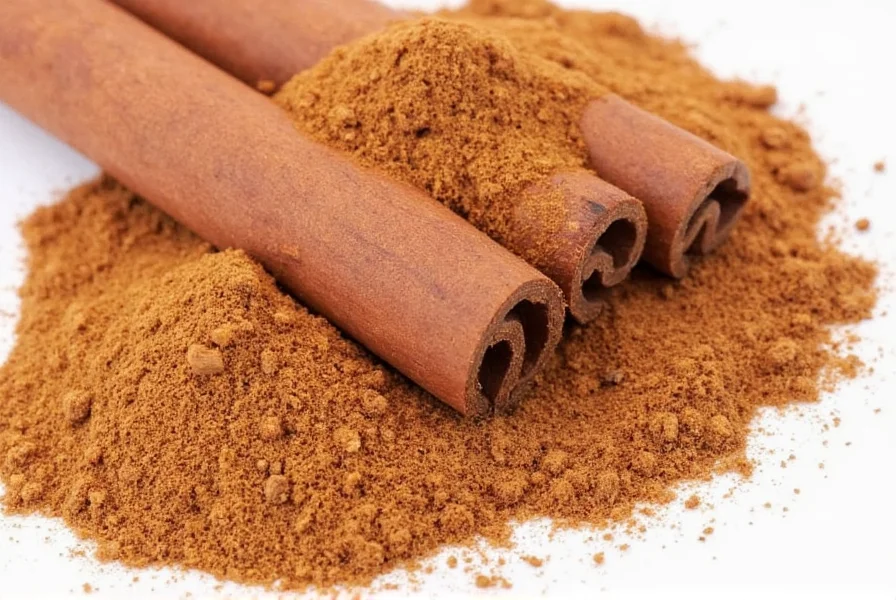
Verdict Summary:
If you cook fancy desserts or sip cinnamon tea every morning, splurge on Ceylon. If you're the kind of person who loves bold cinnamon flavor in everyday baking, Cassia is your perfect match.
Either way, understanding the differences between Ceylon and Cassia cinnamon empowers you to cook smarter, eat tastier, and live a little more flavorful life.

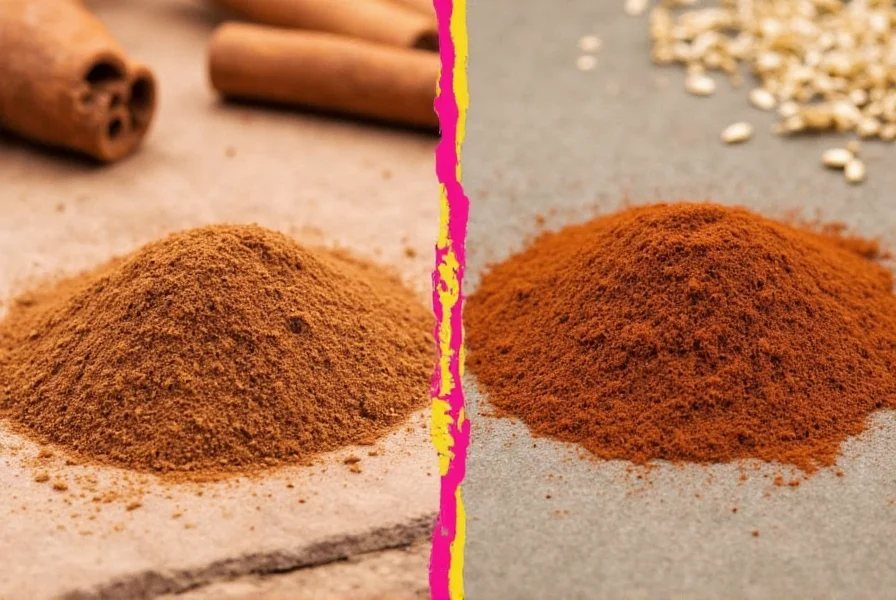









 浙公网安备
33010002000092号
浙公网安备
33010002000092号 浙B2-20120091-4
浙B2-20120091-4